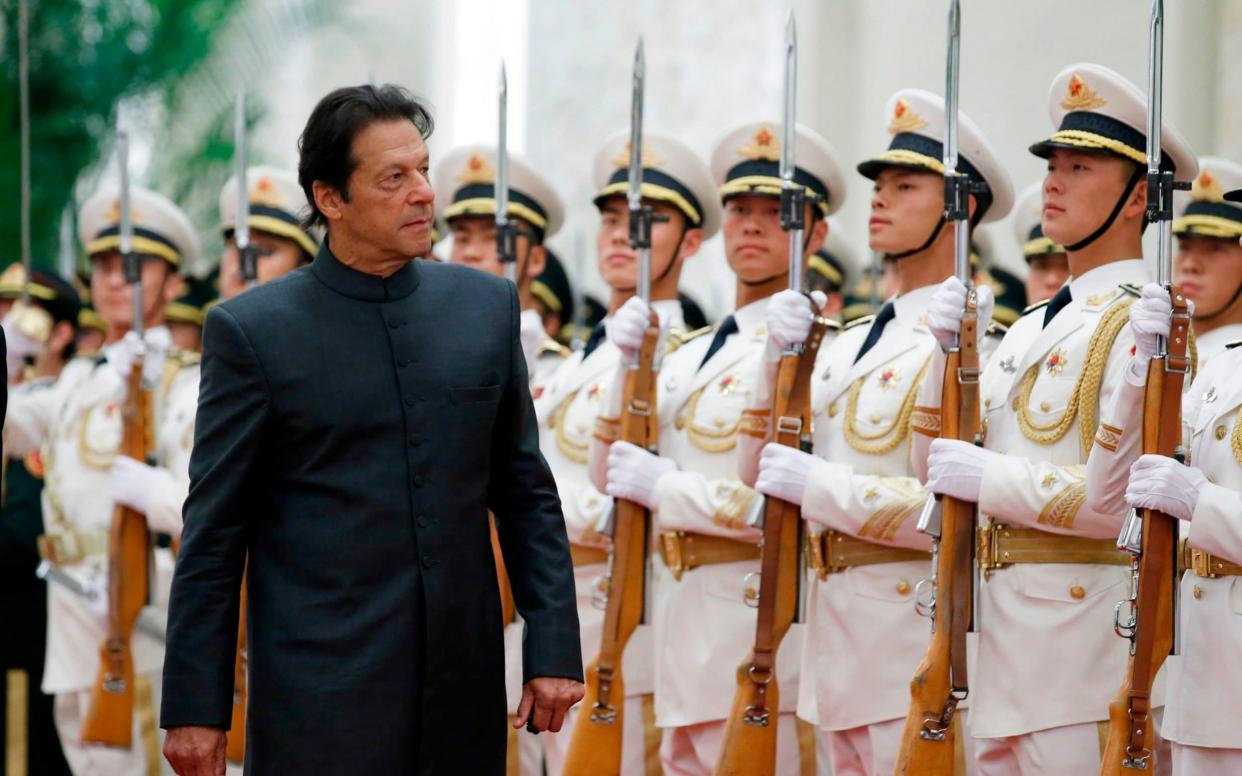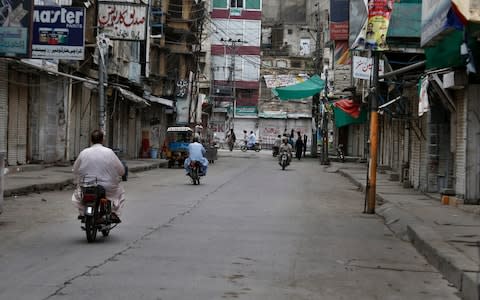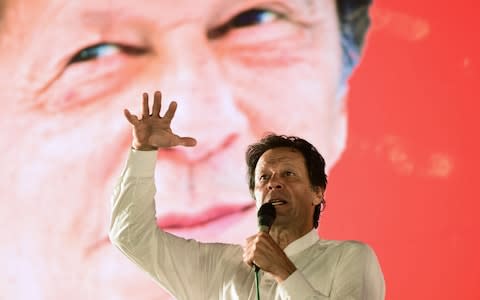Divisions deepen in Pakistan as Imran Khan reaches one year in office

Mohammad Sohail looks around his empty tailor's shop and sighs at the lack of business.
“I was taken by Imran Khan's slogan of change, but the hopes I had have almost vanished now,” he says, surrounded by bolts of cloth, but no customers.
Business is well down since the tailor voted for the former cricketing superstar 12 months ago, while two other salesmen at the cavernous Rawalpindi shop have been laid off in cost cutting.
“He should be given some time, he's only had a year,” his colleague Chaudhry Shabaz counters as they begin to rehash a well-worn conversation of recent months. “I'd vote for him again and I think he will deliver.”
This week marks a year anniversary of Imran Khan's remarkable transformation from sporting legend to prime minister of a 210 million-strong, nuclear-armed nation.
The 66-year-old is due to arrive in Washington on Sunday for his first talks with Donald Trump, where America will again try to court Pakistan's help delivering a political settlement in Afghanistan.
Yet at home Mr Khan leaves an economic slump which has quickly taken the shine off his election win and led many to question his administration's competence.
At the same time the opposition allege his signature anti-corruption purge has been revealed as a skewed political vendetta, as rival after rival is locked up by anti-graft investigators, while any dissent in the media is stifled.
Mr Khan won last year's general election promising a new Pakistan and an end to the corruption, nepotism and poverty which have blighted the lives of many Pakistanis. Rooting out corruption in particular was the rallying cry for him and his Pakistan Tehreek-e-Insaf (PTI) party.
His populist campaign blamed the country's woes on a thieving political elite which spirited away billions into overseas accounts at the expense of health, education and development. Months before polling, prime minister Nawaz Sharif of the PML-N party had been ousted in an anti-corruption investigation after the Panama Papers international leak of documents linked his family to offshore accounts.
Mr Khan's fortunes had also been transformed after years in the political wilderness by the backing of the country's powerful generals, according to diplomats and opposition figures. Though they deny meddling in democracy, they have either ruled the country directly or pulled strings behind the scenes for much of its history.

Mr Khan's promises of a cleaner, more equal country along with a welfare state saw the PTI win the most seats in parliament and then build a coalition with a slim majority.
A year on, a recent Gallup poll said his popularity had plummeted, with his approval rating falling by 13 per cent in a matter of two months.
The satellite town area of Rawalpindi is one of the areas that voted for him. One year later, its residents reflect the deep divide in the country.
“I had more than 1,000 hopes and expectations for Imran Khan,” said Naseem Ahmed, who canvassed for the cricket World Cup winning captain. “Our lives would start to change when this government came; we would be happy and secure. But now we realise we were wrong. I should have voted PML-N.”
Rising prices eating into daily life are his main gripe against his former voting choice. Plenty of others in neighbouring shops defend Mr Khan and urge patience though.
“You can't change things in one or two days, or a small amount of time,” cautioned Mohammad Atiq, a 23-year-old bakery manager. “It was the corruption I wanted to see change and I like how many they have arrested. We are optimistic he will deliver, but it will take some time.”
Mr Khan inherited a looming economic crisis from the PML-N, but it has worsened on his watch. His government is fighting a balance of payments crisis, rising inflation, a falling rupee and low exports. As the forecast has worsened he has been accused of failing to grip the situation while his top economic advisers have been repeatedly changed. An eventual £4.8bn IMF bailout has been accompanied by subsidy cuts and tax hikes.
Mismanagement shows he has been unable to make the switch from populist street campaigner to statesman, says Farzana Shaikh, a Pakistan expert at the Chatham House think tank.
“Clearly the art of governance is one that escapes him,” she said.
She went on: “With some of the previous civilian elected governments, the claim was always that they didn't perform well because the military was determined to bring them down and to place hurdles in their way.
“On this occasion, you can't really say that. If anything I think it's an open secret that Imran Khan's rise to power was facilitated by the military. So he doesn't really have the excuse of having the military establishment arranged against him.”

Any opposition might be expected to have a field day in such circumstances. Instead, the two main parties, the PML-N and the Pakistan Peoples Party (PPP), and their dynastic leaderships are harried by a barrage of anti-corruption investigations from the National Accountability Bureau (NAB).
After the arrest this week of Shahid Khaqan Abbasi in an inquiry into a natural gas contract, two former prime ministers and a former president are now behind bars. Pakistan has a history of politically-motivated corruption purges, often used by the military to undermine civilian rivals.
The opposition says the cases are a selective witchhunt to distract attention from economic woes and questions why the investigations are focused only on them. They accuse Mr Khan of being nothing more than a military puppet. Mr Khan and his supporters say their prosecutions are a long overdue reckoning.
The country's deeply divided and toxic politics have been energised by the PML-N releasing a video purporting to show a senior judge confessing he was blackmailed into jailing Nawaz Sharif in December. The judge says the video was taken out of context and the PML-N was trying to bribe him. Several channels that broadcast the original press conference where the PML-N made the accusation were taken off air. Mr Khan has said he will block any media coverage and interviews with politicians "who are convicts and under trial”.
With such political acrimony, there seems little hope Mr Khan can build consensus to try to get reforms through parliament.
When Mr Khan greets Donald Trump on Monday, he will meet a leader with one eye already on completing his term next year and running for re-election. It is a measure of the difficulties faced by Pakistani leaders that in 70 years, not one of the country's prime ministers has ever completed their term.

